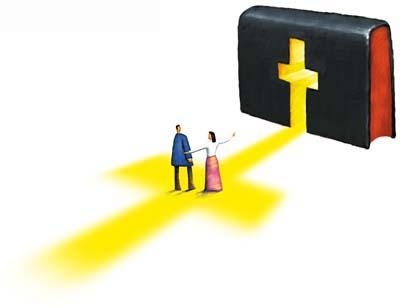
Today I have spent some time reading UnChristian by Kinnaman and Lyons. In response to the the chapter that outsiders think all we, Christians, want is to get them saved, Chuck Colsen wrote this, The Gospel in its Fullness, response to help us change our perception. p. 86-88.
"The good news is summarized in I Corinthians 15: "Christ died on the cross for our sins," so that we can be redeemed. That is the narrow definition that most evangelicals embrace. I think we are wrong in limiting it to that. If you read the first twenty-seven words Jesus spoke in Mark, it's clear that he announced the kingdom. He said that the kingdom of God has broken through into history. He was saying that we would be seeing in his life a picture of the kingdom yet to come. It is a picture of what hte Hebrews called shalom, or peace, or wholeness, extending to every facet of life: the sick healed, the captives freed, the oppressed released, right relationships restored with God and humanity.
Then later, in Acts 4, you see this incredible story of the community of believers coming together. No one was in need because people were sharing their wealth; they were praying and studying the Bible. They created a community that absolutely dazzled the world right after the time of Jesus. They provided a foretaste of the kingdom yet to come in Revelation 22 and 23.
So, I'm one of those who believes that while the gospel is most accurately defined by evangelicals as the "good news," it goes beyond that. For instance, Catholics take it beyond that. The defense of human life is part of the gospel because it matters greatly to God. I think Catholics have a really good point in this. When we think about Jesus ushering in the kingdom, as we pray, by the way, "thy kingdom come, they will be done on earth as it is in heaven," I think we begin to see the gospel in a much broader context.
The local church has to be responsible for "making the invisible kingdom visible," as Calvin said. When the local church is doing what the church is called to do--preaching the gospel, administering the sacraments, and exercising discipline--inevitably the surround culture will be affected. In other words, if we are really living as Christians, the church expands exponentially.
Consider the rise of Christians during the Roman era. People were drawn to Christians, not because of evangelistic outreaches or crusades, or through mass media--those didn't exist. The church grew because Christians were doing the gospel and had a community--a local church--where people really loved each other. During the great plagues that swept Rome in the second century, all the doctors fled, but the Christians stayed and took care of the sick. They embodied what Christians are called to do. Although many Christians died because they took cared of the sick, pagans were drawn to Christ because they saw both the love of Christians and Christianity itself as a better way of life. When Constantine declared Rome the Holy Roman Empire, people thought he did that for political reasons, but he didn't It was already Christianized; he just recognized the realities of what really happened.
One of the things I do when I meet people is ask them, "What is Christianity?" Undoubtedly half will respond, "A relationship with Jesus."
That is wrong. The gospel cannot be merely a private transaction. God didn't break through history, through time and space, to come as a babe, be incarnated, and suffer on the cross just so you can come to him and say, "Oh, I accept Jesus and now I can live happily ever after." That's not why he came...Jesus came as a radical to turn the world upside down. When we believe it is just about Jesus and yourself, we miss the whole point.
I even dislike using the words "accept Christ" anymore--because it is so much more than that. Christianity is a way of seeing all of life and reality through God's eyes. That is what Christianity is: a world-view, a system, and a way of life. I believe that when you truly see the gospel in its fullness, it's so much more. It is the most exciting, radical revolutionary story every told." Chuck Colson - founder, Prison Fellowship Ministries
When I use terms of doing Kingdom work, Chuck Colson helps define this so well. When I think of lives transformed by the gospel I don't think tickets to heaven but those here on earth that are being transformed by Jesus to bring the Kingdom, heaven to earth.
This is what we're praying for to happen in our communities, lives, ministry.
Categories: Gospel, Kingdom, God, Spirituality, Evangelism
"Thy Kingdom come, thy will be done, on earth as it is in heaven." Jesus

No comments:
Post a Comment